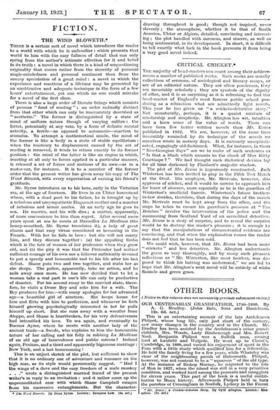OTHER BOOKS.
( Notice in this column does not necessarily preclude subsequent review.)
This is an entertaining memoir of the late Archdeacon Philpot, whose long life, only just short of the century, saw many changes in the country and in the Church. Mr. Bradley has been assisted by the Archdeacon's other grand- children, Mrs. Woods, Lady Birchenough and Mrs. Robert Noel. Benjamin Philpot was a Suffolk man, owning land at Laxfield and Walpole. He went up to Christ's, Cambridge, in 1808, and varied his enjoyment of sport in the Fens with a little study which qualified him for a fellowship. He held the family living for a few years, while Whateley was vicar of the neighbouring parish of Halesworth. Philpot, however, was not content to be a " squarson " of the old type. At the instance of Bishop Murray, he migrated to the Isle of Man in 1827, when the island was still in a very primitive condition, and worked hard among the peasants and smugglers for eleven years. This part of the book is a useful contri- bution to Manx history. Afterwards Philpot held in turn the parishes of Cressingham in Norfolk, Lydney in the Forest • Mr. Evans : a Criebdo-Ddectivs Siory. By Cyril Alington. London : Mao- millan. (Os. net .1
of Dean, and Dennington, which has one of the most beautiful of Suffolk churches—with a genuine and untouched " three- decker "—and one of the noblest rectories in all England. The memoir is instructive because its subject was typical of his class and country, and exceptional only in his physical vigour. The Church of England retains its hold on the people not so much because it has produced an occasional great man as because it has been served by many a man like the Archdeacon.















































 Previous page
Previous page